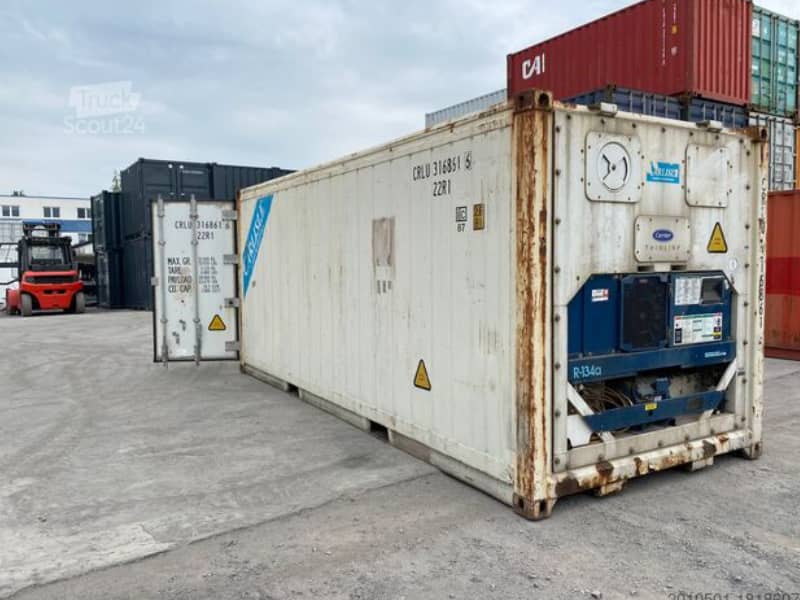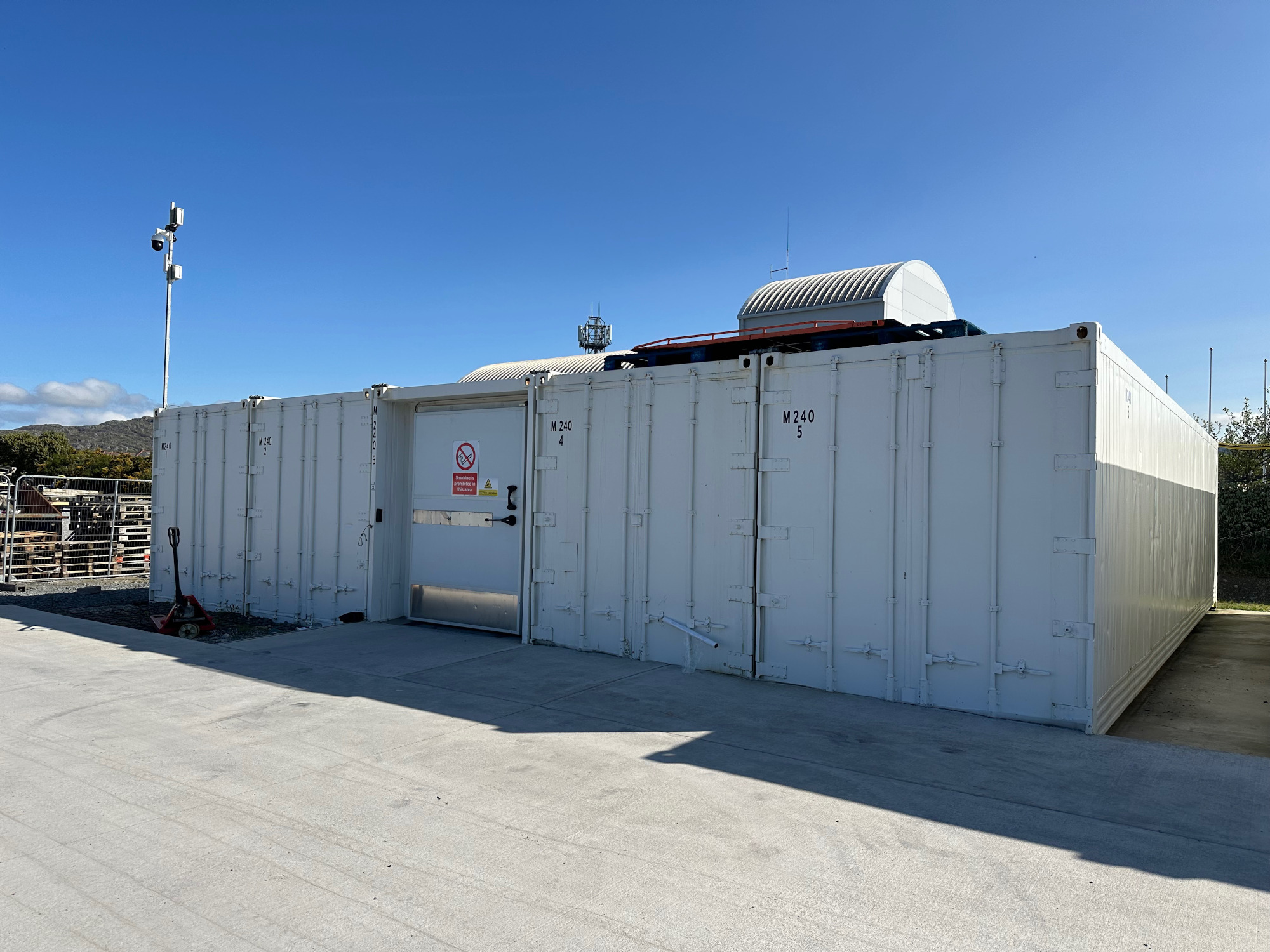All Regarding Cold Storage Containers: Crucial Insights for Your Storage Needs
Cold store containers play an essential duty in the conservation of disposable items. They come in various types, including chilled and shielded units, each designed for details storage requirements. Comprehending the benefits and vital features of these containers is essential for organizations aiming to optimize their operations. As the need for effective storage space options grows, checking out the various choices offered can cause notified choices that influence both profitability and sustainability. What aspects should one think about when selecting the ideal container?
Sorts Of Cold Storage Space Containers
Freezer containers been available in different kinds, each made to fulfill particular temperature level control requirements. Among the most typical kinds are cooled containers, which preserve temperatures between 0 ° C to 10 ° C, making them appropriate for perishable goods like fruits, vegetables, and dairy items. Another kind is the deep fridge freezer container, which runs at temperature levels listed below -18 ° C, suitable for long-lasting storage of frozen products such as meats and fish and shellfish.
Shielded containers offer temperature security without active cooling, making them valuable for short-term transport of temperature-sensitive products. Additionally, there are portable freezer devices, which use versatility in locations and are typically made use of in events or seasonal procedures. Blast refrigerators rapidly lower the temperature of hot foods, making certain safety and security and high quality. Each type serves a distinct purpose in various markets, from food solution to pharmaceuticals, stressing the significance of picking the appropriate container for details storage space requirements.

Advantages of Making Use Of Cold Storage Solutions

Additionally, cold store solutions extend the shelf life of items, decreasing waste and increasing profitability for services. By effectively handling stock with correct temperature level control, companies can maximize their supply chains and improve operational effectiveness.
Additionally, freezer centers permit flexible storage space alternatives, fitting different quantity demands and seasonal fluctuations sought after (used 40ft refrigerated shipping containers). This versatility aids services respond quickly to market modifications
Utilizing cool storage remedies can ensure conformity with health and safety and security policies, safeguarding both customers and companies. Generally, the tactical use of freezer improves item management while promoting sustainability and economic feasibility.
Key Attributes to Seek in Cold Store Containers
When picking cool storage space containers, numerous vital attributes advantage cautious consideration to secure peak performance and dependability. Initially, temperature control capacities are essential; containers ought to keep regular temperature levels suitable for certain items. Insulation top quality likewise plays a significant duty, as remarkable insulation lowers energy usage and enhances temperature stability.
Next off, ease of access and loading is critical; containers ought to provide straightforward styles for efficient handling and company. Resilience is one more important facet; weather-resistant products ensure longevity and secure contents against environmental elements.
Furthermore, wheelchair attributes, such as built-in wheels or lifting points, promote transportation, while customizable formats permit tailored storage space services.
Last but not least, keeping track of systems, including temperature alarm systems and remote monitoring, give real-time updates, ensuring that conditions stay optimal. By concentrating on these attributes, individuals can select cold store containers that fulfill their functional demands successfully.
Selecting the Right Cold Store Container for Your Demands
Choosing the appropriate freezer container calls for a thoughtful assessment of certain demands and operational needs. Aspects such as the sort of items being stored, temperature level sensitivity, and quantity ought to be prioritized. For circumstances, subject to spoiling food products may require containers with stringent temperature controls, while drugs might need accurate problems to maintain efficacy.
Furthermore, potential users must take into consideration the container's size and flexibility. A bigger device might be necessary for bulk storage space, while smaller sized, mobile alternatives might be excellent for on-site or momentary requirements. Insulation quality and energy efficiency are also crucial, as these will certainly affect operational expenses and temperature stability.
Conformity with industry laws and criteria is essential, especially in industries like food and healthcare. By thoroughly assessing these aspects, customers can select a cool storage container that efficiently meets their special requirements and guarantees optimal storage conditions.
Ideal Practices for Maintaining Cold Store Issues
Maintaining optimal cold store conditions is crucial for protecting the top quality and safety and security of temperature-sensitive products. On a regular basis monitoring temperature and moisture degrees is critical; using reputable electronic thermostats and hygrometers can offer accurate look at these guys readings. Appropriate insulation of cool storage containers helps minimize temperature variations and energy loss.
Carrying out a first-in, first-out (FIFO) system ensures that older inventory is used before more recent stock, minimizing waste (used 40ft refrigerated shipping containers). Additionally, preserving an arranged design within the storage space enables better air movement and lessens the risk of cross-contamination
Routine upkeep checks on equipment, such as compressors and seals, are essential to stop malfunctions. Personnel training on ideal techniques for packing and discharging products aids maintain temperature level stability. Maintaining doors shut as much as feasible limits heat exchange, assuring that the cool storage space atmosphere stays efficient and stable in maintaining beneficial products.
Cost Factors To Consider for Cold Storage Space Solutions
When evaluating cold storage options, it is necessary to think about the initial investment expenses together with ongoing operational costs. A complete break down of these prices can reveal substantial lasting financial savings possibility for companies. Recognizing these financial elements helps stakeholders make notified choices regarding their cold store needs.

Initial Financial Investment Costs
The financial landscape of freezer containers offers different preliminary investment costs that businesses need to think about. These costs normally include the purchase or rental cost of the containers, which can differ based on insulation, size, and type quality. Furthermore, expenses connected to retrofitting existing frameworks to accommodate freezer should be factored in, specifically if specialized tools is called for. Installation prices, including electric job and refrigeration systems, also add to the total preliminary financial investment. Organizations should not overlook transport expenses for supplying containers to their wanted place. Lastly, potential customization choices, such as shelving or temperature tracking systems, can even more influence the initial monetary outlay. Cautious budgeting for these elements is crucial for successful freezer execution.
Operational Expenses Break Down
Operational expenditures for freezer options incorporate numerous essential price factors to consider that businesses need to browse. Secret aspects include power expenses, which can be considerable due to the need to keep low temperatures. Maintenance costs are additionally substantial, as routine maintenance is important to guarantee equipment runs effectively and remains certified with health and safety and security criteria. Furthermore, labor costs might occur from the need for specialized personnel to monitor the storage and manage setting. Insurance policy expenditures are one more consideration, as business must shield their investments versus prospective losses. Any type of possible regulatory compliance expenses should be factored in, as companies may require to invest in systems that stick to food safety and environmental guidelines. Recognizing these costs is crucial for effective budgeting.
Long-Term Financial Savings Prospective
Investing in cold storage options provides significant lasting savings potential, changing initial expenses into economic efficiency gradually. By decreasing spoilage and waste, businesses can enhance their profit margins my site substantially. Advanced insulation and energy-efficient systems reduce energy prices, which collect over the life-span of the devices. In addition, cool storage containers typically require much less frequent upkeep compared to standard refrigeration techniques, resulting in lower repair work costs. The capability to shop items for extensive durations without compromising top quality view publisher site allows services to capitalize on market changes, enhancing earnings. In addition, the scalability of chilly storage space options enables firms to adjust to changing needs without incurring too much costs. Overall, these aspects add to a compelling situation for cool storage space as a cost-effective investment method.
Frequently Asked Inquiries
How Much Time Can Food Be Saved in Freezer Containers?
The duration food can be stored in cold store containers differs by kind. Typically, subject to spoiling products last from days to weeks, while frozen foods can stay safe for months, depending on correct temperature and storage space conditions.
Are Freezer Containers Energy-Efficient?
The power performance of cold storage containers varies based on design and insulation quality. Modern systems frequently make use of sophisticated innovation to minimize energy intake, ultimately contributing to lowered functional costs and environmental impact in long-term usage.
Can Cold Store Containers Be Personalized for Certain Demands?
Cold store containers can indeed be tailored to fulfill certain requirements. Alterations might consist of temperature controls, size adjustments, and additional attributes, enabling users to customize remedies effectively for numerous storage space demands and functional choices.
What Are the Usual Dimensions of Cold Store Containers?
Freezer containers typically come in common dimensions such as 10, 20, and 40 feet. These measurements fit numerous storage needs, guaranteeing adaptability for businesses requiring temperature-controlled settings for disposable goods or sensitive products.
Do Freezer Containers Require Special Permits for Use?
Freezer containers often need unique licenses for use, depending upon neighborhood guidelines and meant applications. Authorities may mandate authorizations to ensure safety requirements, ecological compliance, and appropriate functional techniques are preserved throughout their use.
Cold storage space containers come in various kinds, each made to fulfill details temperature level control demands. Furthermore, cold storage space facilities permit for adaptable storage options, fitting various quantity demands and seasonal fluctuations in demand. Picking the right cool storage container requires a thoughtful assessment of operational requirements and details requirements. The economic landscape of chilly storage space containers offers numerous initial financial investment prices that services need to think about. Cold storage space containers can undoubtedly be tailored to fulfill specific demands.